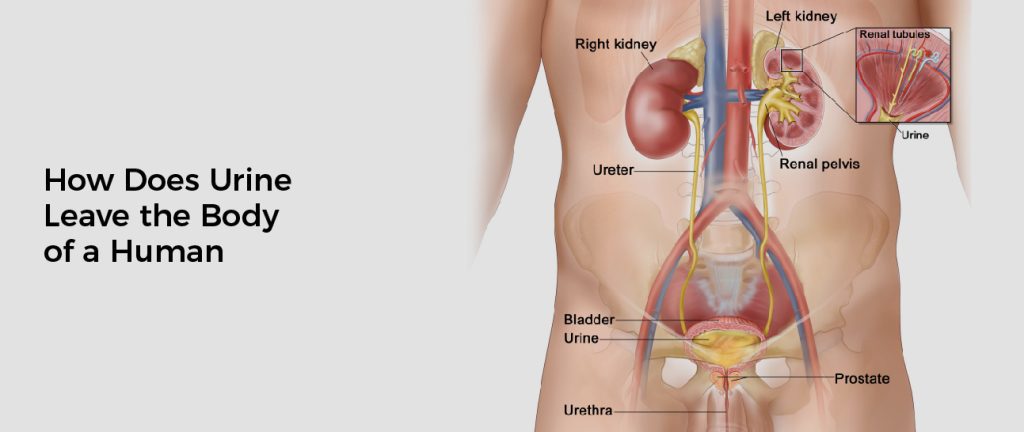Have you ever stood at a urinal and thought, “HOW DOES URINE LEAVE THE BODY OF HUMAN?” Don’t worry – we are here to answer your questions! Urine is produced in the kidneys, filtered through the urinary tract, and finally excreted from the body. In today’s blog post, we will explain how urine makes its way from the kidneys to the outside of your body and touch on some fun facts about this bodily process.
So, if you have been curious about where your pee goes or just want to learn more about how our bodies work – read on for an informative yet entertaining journey into learning about urination!
What is Urinary Tract?
Urinary tracts are part of the body’s drainage system and are responsible for removing wastes and excess fluid from the body. Each part of the urinary tract needs to work together in order for normal urination to occur. Here are the following parts of the urinary tract that can help you to understand how the urinary parts help to leave the urine from the body:=
1. Urethra
The urethra is a tube that carries urine from the bladder to the outside of the body. It is present in both men and women but is longer and wider in men than in women. In men, it passes through the penis, while in women, it passes through the vulva.
- The urethra has three main parts: The proximal or upper part, the middle part, and the distal or lower part. The proximal urethra is located close to the bladder, while the middle and distal parts are situated further away from it
- The urethra serves two main functions: It carries urine out of the body during urination and semen during ejaculation in men. It also serves as a passageway for infection, so practicing proper hygiene and keeping the area clean is important.
If the urethra becomes inflamed or infected, this can lead to painful urination and other symptoms such as fever, chills, and pain in the lower abdomen. Treatment for urethra infections often includes antibiotics or other medications to treat the infection. In some cases, surgery may be needed to repair any damage caused by the infection.
2. Kidneys
The kidneys are two bean-shaped organs located in the lower back on either side of the spine. They are responsible for filtering waste and excess fluid out of the body and regulating electrolyte balance. The kidneys also produce hormones that regulate blood pressure and help produce red blood cells.
Each kidney has at least one million functioning units, called nephrons, which filter blood and produce urine. The functional unit is composed of a small blood vessel, the glomerulus, which filters fluid.
As a part of the urinary tract, the kidneys are surrounded by a unique, specialized lining called the urothelium. The urothelium is composed of three layers of tissue. First, there is a transitional epithelium, which stores urea and waste products and can flatten or distend. These changes regulate the pH homeostasis of the blood. In addition, the urothelium plays an important role in producing red blood cells.
3. Bladder
The bladder is a hollow organ in the pelvis that stores urine until it is ready to be passed out of the body. When the bladder is full, it is stretched out. This wall is made of three layers: a thick outer layer, a thin layer that contains nerves, and a layer of fatty connective tissue.
4. Ureters
The bladder is connected to the urethra by a tube known as the ureter. When the bladder contracts and muscles in the pelvic floor relax, urine is forced out of the body through the urethra. In men, this occurs during ejaculation. In women, it can happen several times throughout the day or only when the bladder is full.
The urethra plays an important role in urination and reproductive health, so keeping it healthy and functioning properly is important. This can be done by drinking plenty of water, eating a balanced diet, avoiding smoking and alcohol, and talking to your doctor if you experience any pain or discomfort in the area.
Why is the Urinary Tract Important?
The urinary tract is an important part of human health, andthe proper functioning of this system can help prevent infections and other illnesses. The kidneys filter wastes from the blood to make urine, which is then transported through the ureters to the bladder, where it is stored until elimination.
How Does Urine Leave the Body
The urinary tract is the system in the human body that produces, stores, and eliminates urine. It consists of two kidneys, two ureters, a bladder, and a urethra. The kidneys are responsible for filtering wastes from the blood to make urine. Urine is then transported through the ureters to the bladder and stored until elimination.
The bladder contracts and relaxes to allow urine to leave the body through the urethra. Urine then exits from the body when pressure from a voluntary contraction of the pelvic floor muscles forces urine out of the bladder and down the urethra. This process is known as micturition or urination.
Urine is eliminated from the body through the urethra in a steady stream until all stored urine empties from the bladder.
The urinary tract is constantly monitored by an organ called the trigone, which senses when fluid enters and leaves the bladder. This helps to keep track of how much urine is stored in the bladder and prevents overfilling. Urine exiting the body is generally sterile and does not contain bacteria or other potentially harmful organisms.
The urinary tract is essential to human health, and proper functioning can help prevent infections and other illnesses. When urine flows freely from the body, pressure on the bladder and kidneys is relieved, allowing them to function properly.
What Affects the Amount of Urine You Produce?
The amount of urine produced by the body is affected by several factors, including the intake of fluids and certain medications or foods. The body may produce more or less urine depending on the individual’s diet.
Eating a balanced diet with plenty of fruits and vegetables can help to ensure that adequate amounts of urine are produced. Drinking plenty of fluids also helps keep the urinary tract functioning properly and helps to prevent dehydration. Certain medications, such as diuretics or water pills, can increase urine production. In contrast, drinking alcohol or caffeine can reduce the amount of urine produced by the body.
Symptoms Of Urinary Incontinence
Urinary incontinence is a common problem that affects millions of people. The condition causes urine leakage during sneezing, coughing, laughing, and other activities.
Many different health conditions can cause it. Men and women are at risk for developing urinary incontinence, and symptoms can range from mild to severe. While there is no cure for this condition, there are treatments that can help relieve the pain and discomfort.
A doctor will diagnose the cause of your incontinence by performing a thorough physical examination. They will ask about your medical history and check your pelvis and urethra.
Your doctor may also recommend that you take a urinalysis. This test can tell whether you have a bladder infection, prostate problems, or urinary tract obstruction. If you have an infection, your doctor may prescribe antibiotics to clear it up.


